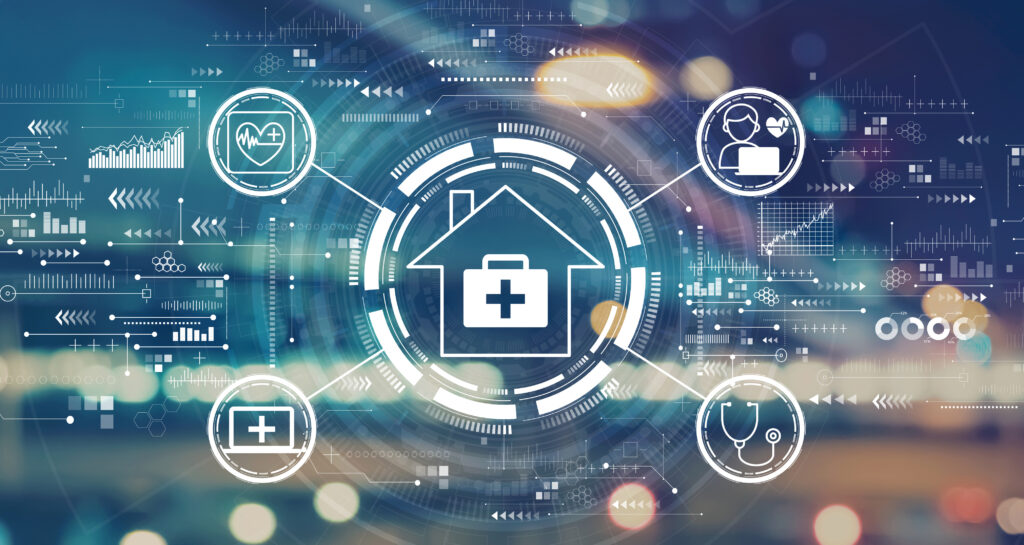Ever since the invention of the telephone, some patient-doctor interface has been conducted “over the wire.” However, in recent years, with the advent of more sophisticated technology, the phone is just a part of the means with which medical professionals are providing services, including diagnosis and advice to patients.
Fundamentally, telemedicine can allow patients to communicate with healthcare providers using telephonic technology, as opposed to physically visiting a doctor’s office or hospital. With telemedicine, discussions of symptoms, medical issues, and even more can allow a healthcare provider, sometimes even using video in real time, to provide help with email follow-ups, including testing results and reports.

Doctor House Calls Are Back!
Since telephones have become “smart,” along with many desktop & laptop computers, more and more patients are having their doctor visits online. At home, in bed, anywhere! Using telemedicine, you may be able to receive a diagnosis, learn your treatment options, and get a prescription. In cases where it’s necessary, healthcare providers can even monitor readings from medical devices remotely to keep an eye on your condition.
It should be noted Telemedicine is not appropriate methodology for emergency situations, such as heart attacks. Call 911 in case of an emergency.
Types of telemedicine may include:
- Interactive medicine, or “live telemedicine.” Here, physicians and patients communicate in real time.
- Remote patient monitoring, where in caregivers monitor patients who have mobile medical equipment that collects data on things like blood pressure, blood sugar levels, etc.
- Providers can also share a patient’s health information electronically with other healthcare professionals or specialists.
Telemedicine vs. Telehealth
With Telemedicine, a physician in one location uses a telecommunications infrastructure to deliver care to a patient at a distant site.
Telehealth is different from telemedicine in that it refers to a broader scope of remote healthcare services that might include some aspects of telemedicine. Telemedicine refers specifically to remote medical clinical services, while telehealth usually refers to remote non-clinical services, such as providing basic health information, non-prescription services and general healthcare recommendations. It should be noted that these terms are sometimes be used interchangeably. But there is a difference. In short, all telemedicine is telehealth, but not all telehealth is telemedicine.
The World Health Organization (WHO) defines telemedicine as “healing from a distance.” This gives you the freedom to receive treatment without needing to schedule an appointment with your physician to go to their office for medical services.
HealthIT.gov defines telehealth as “the utilization of electronic information and telecommunications technologies to support and promote long-distance clinical healthcare, patient and professional health education, public health and health administration.” Telehealth is not a service. It is a way to improve patient care and physician education. Telehealth expands beyond telemedicine, to cover non-clinical events like appointment scheduling, continuing medical education, and physician training.

How Does Telemedicine Services Work?
The need for more accessible healthcare is a driving force behind the growth of telemedicine. Whether a patient lives in a remote area or has a busy schedule that doesn’t allow time to visit a physician, telemedicine can help improve a person’s overall health and well-being. And it can also help your financial health. Access to a telemedicine provider can reduce the need to visit the emergency room. According to a 2017 study, the average telemedicine visit costs $79. The average doctor’s visit is $149 and the average trip to the emergency room is $1,734.
And as the popularity of telemedicine grows, many health insurance plans are beginning to offer coverage for telemedicine visits. Some states have enacted laws that require health insurance plans to reimburse telemedicine visits at the same rate as in-person doctor visits. Medicaid may also offer reimbursement for telemedicine services as long as they meet all federal requirements and eligibility. It’s best to check with your specific plan’s benefits before using telemedicine to understand your financial obligation.
Does My Doctor Offer Telemedicine Services?
The best way to know if — and to what extent — your current healthcare provider offers telemedicine services is to ask. Your physician’s practice administrator or manager should be able to explain what telemedicine services are offered, as well as the associated costs.
“The Boston Medical Group Telemedicine (BMG), the globally recognized medical practitioner leader in the area of Erectile Dysfunction (ED), proudly unveils its new Telemedicine Division. As part of its comprehensive offering to patients, this enables them to book online sessions from the comfort of their own home.” It was recently announced by Daniel Ha, one of the codevelopers of The Boston Method®, the patented method for diagnosing and treating ED that has been successfully utilized by BMG for over 20 years.
Boston Medical Group Telemedicine is pleased to add the new Telemedicine Center for ED at this critical time of expansion. We continue our efforts to innovate and build our organization to its fullest potential. This new division will successfully complement our growth strategy with a keen focus and commitment to excellence for our valued patients throughout the country.
This new Telemedicine Center for ED, facilitates direct sessions for patients. As such, BMG has further expanded its national footprint. The online Telemedicine portal additionally provides the latest in-depth information on sexual performance solutions and best options for men with ED, discreetly addressing their individual needs and associated issues. BMG’S revolutionary treatments in ED have included: The Boston Method®; Low-T and Regenerative Therapy with exclusively featured BostonPRP, RejuvaPulse™ Therapies, Cardiovascular Neo-Genesis; and Stem-Cell EVS with Exosomes. For patients who don’t respond to the common ED pills (Viagra/Cialis), BMG also has available a range of combination pills for erectile dysfunction and premature ejaculation sourced from a registered FDA 503B compounding pharmacy.
Many patients know the treatment, Rx they are looking to refill. This includes ICP/ED shot refills. Boston Medical Group Telemedicine makes it easy to talk to a doctor via telemedicine to renew prescriptions. You may fill out a request here. Please note, there are certain medical regulations, starting with a simple patient authorization to release records (when moving from one provider to another).

